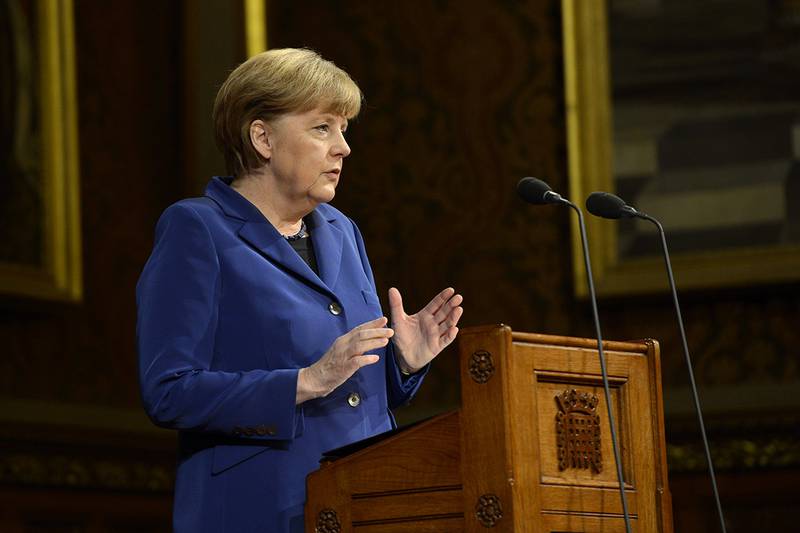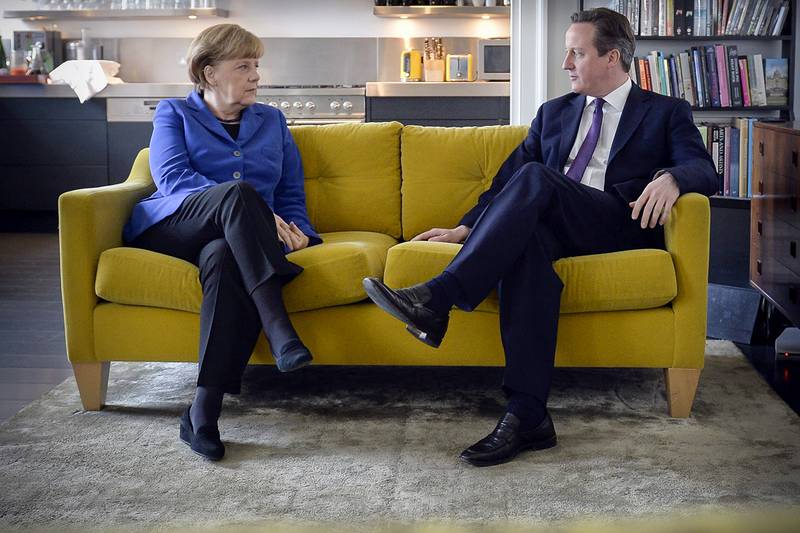Merkel Is Mutti Not Only To Germans But To All Europeans
Adelina Marini, March 6, 2014
 2 weeks ahead of the long awaited visit by Angela Merkel in London, I myself had to go to the British capital. I have to admit that my heart was bleeding because I have the stamp on my ID documents saying "Bulgarian" and I was worried how exactly will I pass the border control after the hysteria surrounding the removal of labour restrictions for Bulgarians and Romanians on January 1st this year. This tag "unwanted" in my documents has created quite a lot of troubles for me in the past years when I travel throughout Europe by car. The minute they notice my Bulgarian license plates the authorities in countries like Austria, even Hungary, Slovenia, Germany, immediately stop me for a thorough check to which usually are subjected the citizens of candidate countries, especially Bosnians, Serbs, Turkish.
2 weeks ahead of the long awaited visit by Angela Merkel in London, I myself had to go to the British capital. I have to admit that my heart was bleeding because I have the stamp on my ID documents saying "Bulgarian" and I was worried how exactly will I pass the border control after the hysteria surrounding the removal of labour restrictions for Bulgarians and Romanians on January 1st this year. This tag "unwanted" in my documents has created quite a lot of troubles for me in the past years when I travel throughout Europe by car. The minute they notice my Bulgarian license plates the authorities in countries like Austria, even Hungary, Slovenia, Germany, immediately stop me for a thorough check to which usually are subjected the citizens of candidate countries, especially Bosnians, Serbs, Turkish.
I expected at the British border control for the ferry from Dunkirk to Dover to be asked questions like "what's the purpose of your visit?", "where will you be staying?", "do you have a reservation?", do I have enough cash for the time of my visit and other questions from the visa period. My surprise was grandiose when, in fact, the big hurdle was at the French border control. A young officer was examining the documents of my four-member family in the course of 15 minutes, looking at them under various lights and even a spying glass. Quite a humiliating experience, given that out of the several tens of cars headed for the ferry, we were the only one subjected to such a thorough ID check. Unlike the French border police, though, the welcoming party at the British border was surprisingly nice and we were even wished to enjoy our stay.
As a person born in a totalitarian Bulgaria, who listened to the BBC World Service or the Bulgarian section of the Deutsche Welle and later Radio Free Europe, whose life was yet to begin in the autumn of 1989 when I was 17 years old, I expected that the fall of the Berlin wall and later my homeland's accession to the EU will give me exactly the freedom I missed in Bulgaria - to be able to travel whenever and wherever I want, without wearing the star on my clothes showing that I'm a second hand citizen, to have access to goods without any restrictions by the censorship, to read whatever I want, to watch whichever TV station I like and to meet whoever I want, to work wherever I desire and live wherever I deem good.
25 years later I don't feel an equal citizen of the EU. On the contrary. I still am an unwanted half-European, who is perceived as a threat to the West's prosperity. To some extent my Italian name comes to rescue, but only until I answer the question "You're from Italy, right?" with "No, I'm Bulgarian". Then, visibly, the interest drops and a sort of unpleasant disappointment is felt. My experience is not an exception. A friend of mine recently told me she was so much pissed off of such an attitude that to the question "Where are you from?" she answers with "Nicaragua". Such moods made me much more realistic about the EU and I sometimes catch myself being sceptical about its future. Until I read Angela Merkel's speech before the two chambers of the British parliament.
I was hugely surprised when, instead of my expectations Merkel to talk about a strongly integrated euro area, with a possible budget, new institutions and special relations with the UK, about a redefinition of the freedom of movement of people in the EU with an inclination toward half-freedom, she spoke about ... me. She shared her memories from her first visit in London in the spring of 1990 - the period between the fall of the Berlin wall and Germany's unification. She specifically mentioned that corner in Hyde park where everyone can freely stand and say whatever they want against the government and  even the Queen. Merkel spoke also about Britain being a cradle of democracy and rule of law, as if wishing to remind the country something it obviously has forgotten in the past few years.
even the Queen. Merkel spoke also about Britain being a cradle of democracy and rule of law, as if wishing to remind the country something it obviously has forgotten in the past few years.
"As someone who lived for 35 years under the yoke of dictatorship in the GDR, denied my freedom, I have a special affinity with the unconditional desire for freedom and democracy which this Parliament and this country embody like few others", Angela Merkel said a day after I left the Island after another thorough check at the French border control, while an angry Englishman behind me was pushing his horn because some Eastern Europeans were delaying him. Merkel continued to speak as if on my behalf: "For me personally, as for millions of people behind the Iron Curtain, the fall of the Berlin Wall in 1989 was a moment of incredible happiness". For the angry Englishman, Europe is obviously just business.
Cameron's disappointment
In 2012, Britain's slogan до the summer Olympic games was London Calling. The idea was the country to position itself as a tourist destination, especially in the context of the games. The success was huge and helped the United Kingdom forget for a little while its problems. And these problems can be summed up with the following slogan: London Crying. For or, rather, from the European integration.
The British prime minister invested the past two years of his political life to make the issue of EU reform a major one for his term. The British newspapers had three topics that were on the first pages during the two weeks I spent on the Island - a EU referendum and, of course, the Union reform, Scotland's leaving the United Kingdom and the crisis in Ukraine. That is why, the visit of Merkel, who in the past months intensively joined the debate on treaty changes, was very much anticipated by Cameron. If he were to receive her support, that would have been a huge victory for him domestically, but would have also been a strong signal the division of Europe to continue. Angela Merkel, however, in the very beginning announced she would disappoint him and she gave her support to ... me.
"European integration shows that we have learned the lessons from bloody conflicts and a painful history. Together we have changed Europe for the better. Thanks to the peaceful revolution in Central and Eastern Europe, whose 25th anniversary we are celebrating this year, it was possible to overcome further frontiers in Europe. Current events in Ukraine demonstrate how grateful we should be for this good fortune. We stand shoulder to shoulder with people there, and in many other countries, as they struggle to protect justice and freedom".
With her speech, Angela Merkel called on David Cameron's Britain not to build another Iron Curtain, to grow beyond short-term political dividends and to think about the long-term political and economic consequences. "Indeed, we need courage to bring about changes for the better just as much today as we did decades ago if we are to continue the success story of European integration. For what is at stake today is no more and no less than whether Europe will be able to assert its values, its  interests as well as its economic strength and social model, which have given people prosperity, on a durable basis in the world of the 21st century".
interests as well as its economic strength and social model, which have given people prosperity, on a durable basis in the world of the 21st century".
The German chancellor's decision to focus on the lessons from the world wars in Europe in the past century, the EU's fundamental values such as democracy, rule of law and freedom, leaving far behind the current problems in the euro area, clearly shows that for Ms Merkel Europe is much more than a single market. To her, Europe is an ideal, which only a person who lived on the dark side of the Iron Curtain can understand. For me, she turned into a mutti under whose wing I feel protected. In this regard, the EU has a huge historical chance that right now at the helm of the motor of the European integration is a person with such an experience, because she can be a strong brake for the deconstructive forces led by populistic narrow views.
Merkel's European speech in London, however, was not aimed only to cool down the British desires to leave the European Union. It is also a wake up call for the "new" member states who have yet not succeeded to entirely absorb the European system of values and linger forward and backward. Angela Merkel reminded them the meaning of their EU accession. That is why the fragile new member states should again recall what the freedom and democracy they strove for actually mean. They should stop measuring them only through access to EU funds or through national interest understood as "we have to learn to say NO on European stage". This wake up call, precisely in London, should sound as a warning for those countries who are learning slowly the European lessons that it will be harder and harder to keep away the anti-European forces. And this will be at great harm to all. "When we look back, European integration – which has brought us peace, freedom and prosperity for more than half a century now – almost seems like a miracle: from the Franco-German friendship to the excellent cooperation among the 28 EU member states in today’s European Union".
It seems so, but the reality is that, still, a lot of European effort is necessary to overcome the division to Europeans and half Europeans because of which EU citizens feel ashamed of their origin and are treated as second hand people only because they come from Europe's poorest corner which is constantly a subject to predatory attacks by forces who do not share the European values. The European integration is in its very beginning because very few are the countries that can boast similar level of economic, social and political development. So, the conversation about a EU reform must pass through us not forgetting what united us in the first place.
That is why, thank you, mutti, for doing precisely that, precisely in London, precisely in the context of Ukraine. The rest is just technicalities.
 Federica Mogherini | © Council of the EU
Federica Mogherini | © Council of the EU | © Council of the EU
| © Council of the EU Luis De Guindos | © Council of the EU
Luis De Guindos | © Council of the EU